Fructose triggers hibernation & increased appetite, & reduced energy availability which causes lower activity.
Fructose makes us fat and tired, probably because it is signaling us as mammals to go into hibernation...but we are not mammals who traditionally hibernate.
Fructose seems to trigger weight gain and reduced activity and it seems to be a naturally occurring trait seen routinely in animals that hibernate and birds that are preparing for a long migratory flight. That is odd concept - birds fatten themselves up before their marathon - like the athlete loading up on spaghetti before a marathon maybe. It is hard to visualize a fat bird though. Penguins, ducks? Ostriches - what are they hiding under those feathers? (…a Burlesque show?)
We can also make our own fructose from glucose and that alternate pathway may be stimulated by a lifestyle that has excessive salt, stress, alcohol, and/or purines (uric acid).

Video - A Tale of Two Sugars - Dr. Richard Johnson, (Youtube)
Elevated uric acid is associated with increased foraging behavior - increased activity and impulsivity. ADHD may be related to being better at foraging. If the foraging doesn’t lead to more food, then activity level will be reduced - tired now.
Fructose inhibits standard energy production so there would be less ATP available.
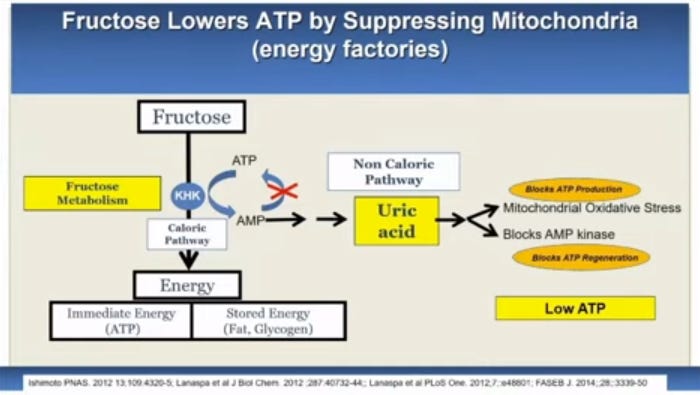
This drop in energy availability causes more hunger, more appetite, more foraging behavior, and more weight gain for the bear getting ready for winter hibernation. Or the human living in a abnormal modern world that is totally disconnected from nature, and yet is signaling the human to get ready to hibernate.
{This is all making so much sense after my recent uric acid issues, and difficulty giving up foods that were hurting me - the unhealthy response to feeling ‘deprivation’ → eat even more of the forbidden food - forage through all of the cupboards for any you forgot about. Chagrin.}

Where I don’t want to keep heading is towards worsening non-alcholic fatty liver disease or something else chronic.
Epidemic rates of ill health may involve the increase in fructose within our modern diet, plus an increase in conversion of glucose to fructose triggered by excess salt, stress, alcohol and purines/uric acid (taking high dose folic acid would add to that, or lots of meat and sardines, or a lot of folate rich green veggies).
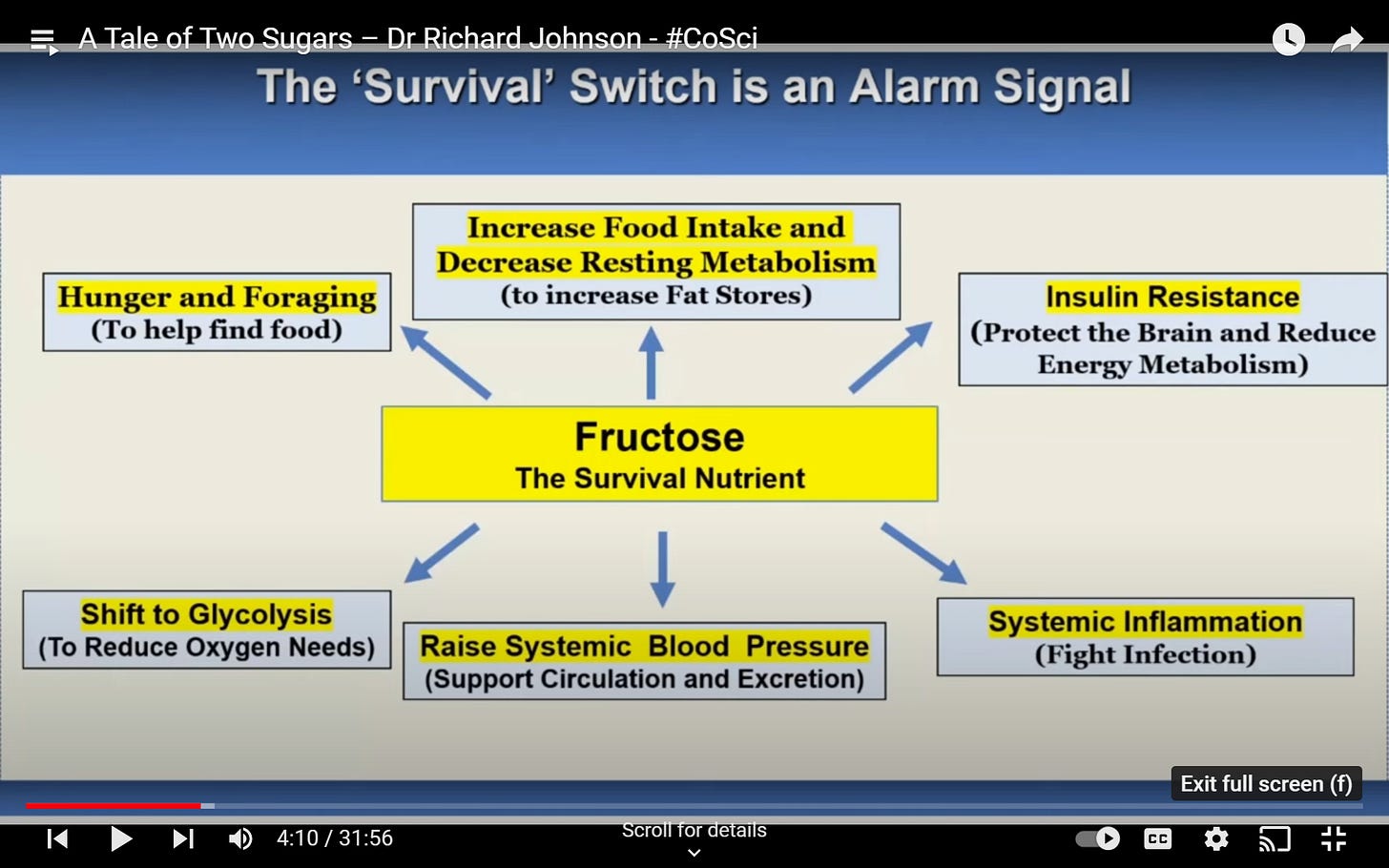
In animals, a high fructose diet leads to Alzheimer’s like amyloid tangles in the animal’s brains. You can block early dementia from occurring in animals that have diabetes, by blocking the fructose kinase enzyme within the brain. The brain makes extra fructose from glucose in situations of hyperglycemia. So ‘Diabetes Type 3’ may be a good alternative name for Alzheimer’s dementia. An elevated level of uric acid for whatever reason (genetic or dietary) is also associated with Alzheimer’s dementia.
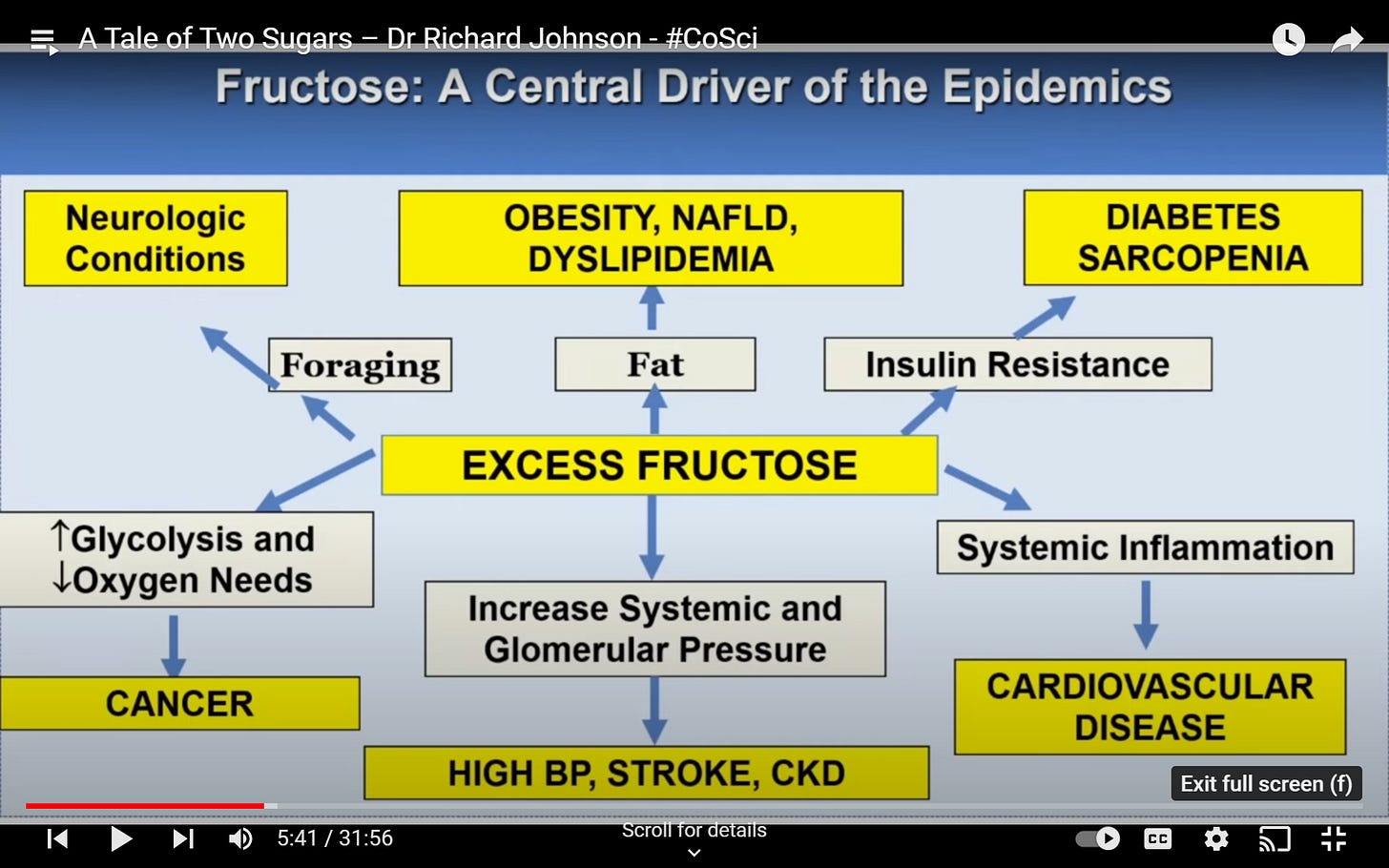
Following a Keto or low glycemic diet is Dr. Johnson’s recommendation for preventing dementia. I recommend or try to follow about a 30% calories from carbohydrate diet, with minimal 1-2 fruit servings, 20% protein and 50% fat, with less than 10% from saturated fats. Too high of a fat total or a Saturated fat total in the diet ratio can inhibit methylation cycles needed for epigenetic control within the cell nucleus.
Elevated fructose within the brain has been observed in people with Bipolar disorder compared to the neurotypical control group and a group of people with other neurologic diagnoses. Higher levels of fructose also seemed dose dependent with more severe symptoms and treatment resistance resulting in more hospitalizations. that could fit with the pattern of more foraging/impulsive behavior (manic period), followed by an energy crash (depressive period).
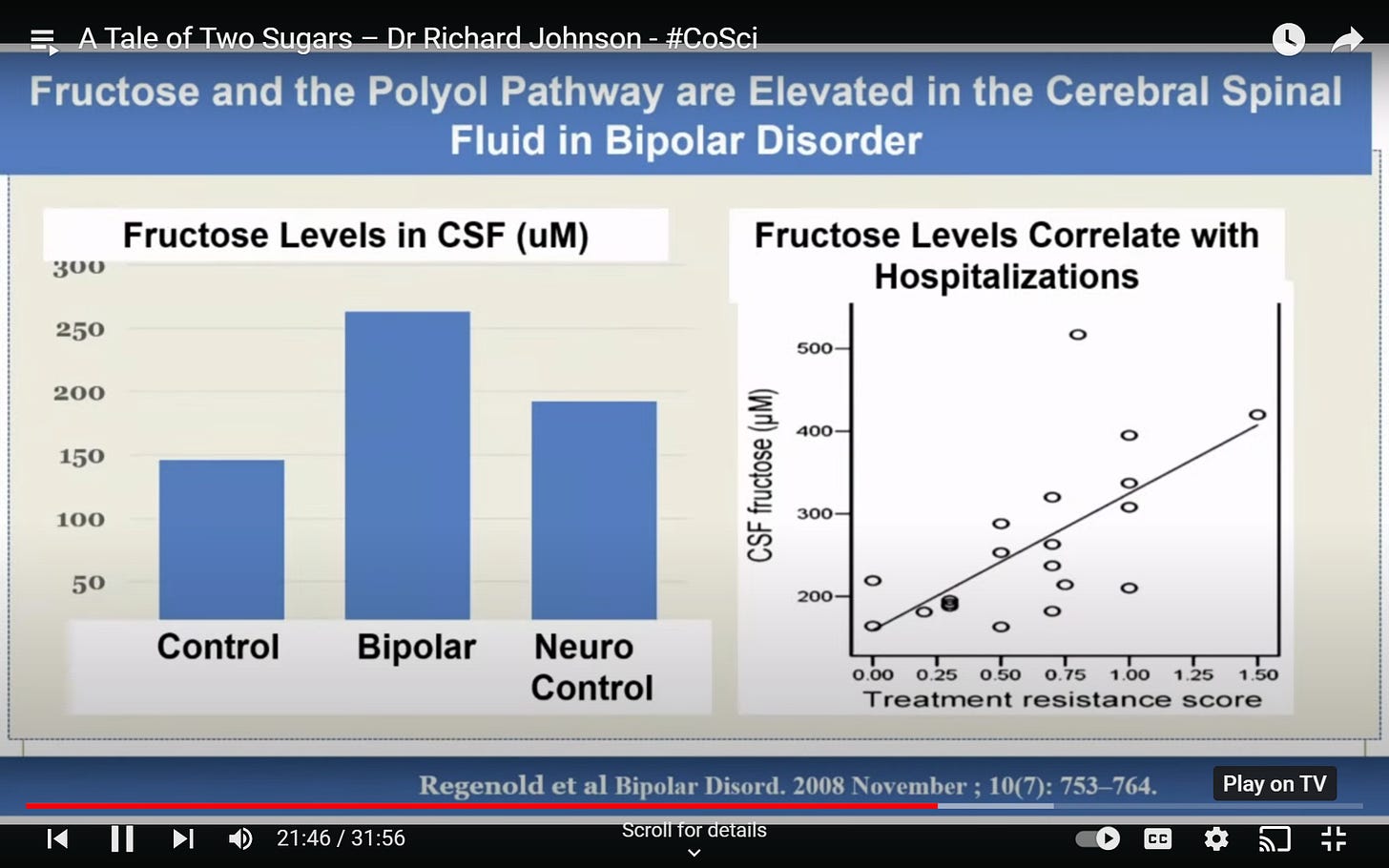
Aside - from a different webinar by psychiatrists, a person’s sleep patterns may be a way to help tell Bipolar disorder from Trauma responses. People with Bipolar disorder will sleep only one or no hours at night during the mania and have no complaints - that is all they needed, while someone with seeming mania but it is more of a trauma pattern, may sleep shorter nights than average but will complain about poor sleep and maybe insomnia. Suggesting to me that => I am an early trauma survivor who didn’t handle menopause well - it can seem mood swingy. I kept being told that I must have been like this all my life, and those psych doctors were just false. When a healthcare provider is telling you ‘facts’ about your life which they couldn’t know, then find a new health care provider or at least disagree.
Additional point from the video comments, and hello DCGReenZone (old Twitter friend):
Comment: @DCGreenZone, 23 hours ago, Fructose blocks the conversion of D3 into its active form. Credit, Dr. Roger Seheult.
What is a solution according to Dr. Johnson? Allulose
Allulose is a slightly different form of the same atoms that form fructose. It has an almost opposite effect on our metabolism. It is a natural sugar but found in lower amounts in our food supply. It stimulates the same appetite controlling hormone, GLP-1, which the trendy weight loss drug Ozempic, semiglutide, which can cost @297/month. That drug does show amazing weight loss rates, but almost all the weight comes back on fairly promptly after going off the drug. And the drug has a lot of potential side effects.
Dried figs, dates, or kiwi, and maple syrup and brown sugar are sources of allulose.

Eating more allulose might help promote weight loss by helping with the GLP-1 hormone. Substituting allulose for other calorie sweeteners may help with weight or health issues but does not cause the dramatic weight loss seen with the expensive and side effect inducing Ozempic. Dr. Johnson disclosed that he has been working with a company looking into the product potential of allulose. He suggested the low glycemic or keto diet approach earlier in the video too, which is likely a more direct route to weight loss.
However Pure Maple Syrup has been one of my staple foods for my mother - even though sugar isn’t good for cancer or Alzheimer’s - she likes it, and it has good mineral content. Dried figs were a favorite road food for me because they keep well and are so chewy that eating a serving of three is satisfying, where delicious dates make my sweet tooth want lots more of them. Overeating dried fruit in order to get more allulose would likely not lead to weight loss as much as keep heading towards Non-Alcoholic Fatty Liver Disease or Alzheimer’s dementia due to the excessive fructose and total carbohydrate intake.
A serving of dried figs though, is also a rich source of phytonutrients … and salicylate. Caution. Kiwi are also an oxalate source.
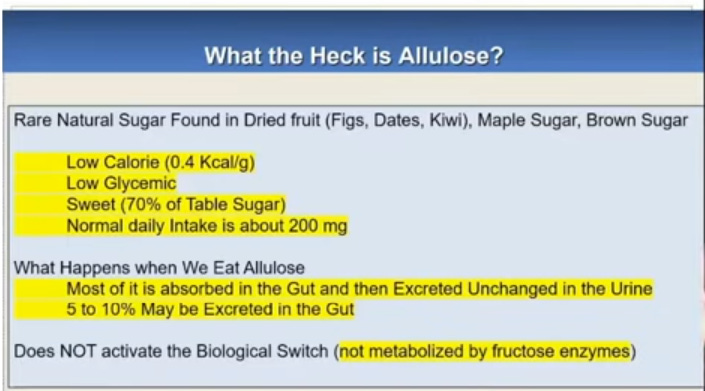
My Squirrely Semi-Keto Vegan Diet is based on what I tend to eat that leads to weight loss or maintenance rather than scarfing way too many Medjool dates at one time which lately led to salicylate puffiness (fake fat - you feel overweight but it is hard/under pressure water weight and it can hurt) and fluffy adipose real fat being gained under that. Eating higher fat, low carb nuts and seeds satisfies me without sending me looking for sweet things. I do tend to want some potassium rich food with them like a half an apple or pear, or some Jicama or a salad and some salt occasionally unless it is salted seeds or nuts. I try not to buy those as the salt can also trigger over-eating for me.
The best diet for you is one that you work for yourself over time by paying attention to what feels better the next day or two and what doesn’t. Watch for the patterns of what makes you feel more energetic, cheerful and focused - then try to do more of that. Readjust as stress levels, seasons, or aging changes what is working. Change happens, it is our job to try to keep up.
Introducing my "Squirrely Diet" - Vegan Keto? is that even possible? & an overview of the special diet books I've read recently.
Summary thoughts after reading a bunch of special diet books. Paleo - what did our ancestors eat in prehistoric times? All usable parts of wild game, non-starchy veggies and a few tuberous root vegetables, and berries. The Paleo Answer by Loren Cordain does provide a lot of answers with solid academic referencing and discusses the science in an approacha…
Disclaimer: This information is being provided for educational purposes within the guidelines of Fair Use and is not intended to provide individual health care guidance.


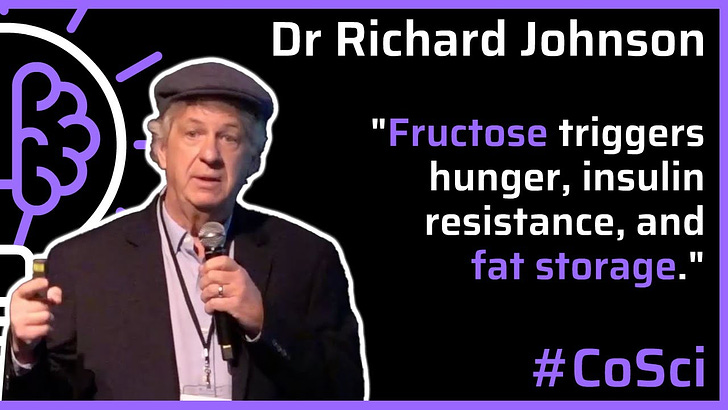



Very interesting Jennifer.
Do Honey loving Bears go literally crazy due to Fructose?
I've asked before what happens to injected Sucrose from Covid19 Jabs > Fructose ?
With the coming of the Holocene, the hibernation reflex becomes inefficient in that you could be active but are sleeping instead. In the cold, the hibernation reflex is efficient in that you cannot engage in activity when you should be conserving energy and calories.
I don't believe epigenetic expression works the way people think it does. Even if the instinct atrophies to where it seems to have vanished, it's still there awaiting epigenetic activation. Genes don't vanish from lack of use, they go dormant until they are needed again.
Hibernation is like that. It's still there ... and high fructose corn syrup activates it. The problem is we don't hibernate. Our bodies and brains go to sleep but we are still walking around ... looking for more corn syrup. It is no shock all the side effects that occur as a result.